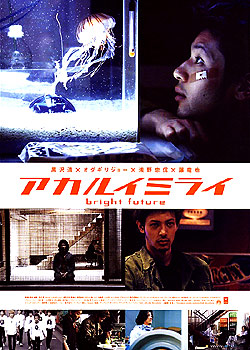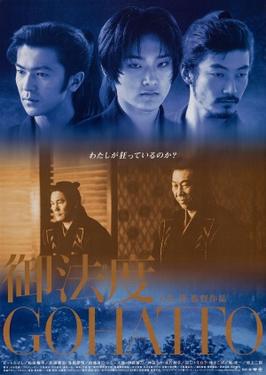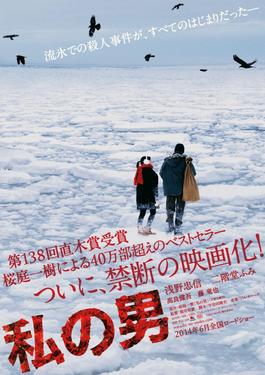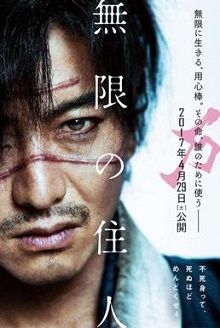
Takashi Miike is a Japanese film director, film producer and screenwriter. He has directed over 100 feature film, video, and television productions since his debut in 1991. His films span a variety of different genres, ranging from violent and bizarre to dramatic and family-friendly movies. He is a controversial figure in the contemporary Japanese cinema industry, with several of his films being criticised for their extreme graphic violence. Some of his best known films are Audition, Ichi the Killer, Visitor Q, Dead or Alive, One Missed Call, and various remakes: 13 Assassins, Hara-kiri, and Graveyard of Honor. He has also acted in more than 20 films.

Tadanobu Satō better known by his stage name Tadanobu Asano is a Japanese actor, director, and musician, who has had an extensive career working in both Japanese and international cinema. He has been nominated for five Japan Academy Film Prizes, twice for Best Actor and three times for Best Supporting Actor, and winner of its Most Popular Performer award.

Alexander Romanovich Luria was a Soviet neuropsychologist, often credited as a father of modern neuropsychology. He developed an extensive and original battery of neuropsychological tests during his clinical work with brain-injured victims of World War II, which are still used in various forms. He made an in-depth analysis of the functioning of various brain regions and integrative processes of the brain in general. Luria's magnum opus, Higher Cortical Functions in Man (1962), is a much-used psychological textbook which has been translated into many languages and which he supplemented with The Working Brain in 1973.

Christopher Doyle, also known as Dù Kěfēng (Mandarin) or Dou Ho-Fung (Cantonese) is an Australian-Hong Kong cinematographer. He has worked on over fifty Chinese-language films, being best known for his collaborations with Wong Kar-wai in Chungking Express, Happy Together, In the Mood for Love and 2046. Doyle is also known for other films such as Temptress Moon, Hero, Dumplings, and Psycho. He has won awards at the Cannes Film Festival and Venice Film Festival, as well as the AFI Award for cinematography, the Golden Horse award, and the Hong Kong Film Award.

Maborosi, known in Japan as Maboroshi no Hikari, is a 1995 Japanese drama film by director Hirokazu Kore-eda starring Makiko Esumi, Tadanobu Asano, and Takashi Naito. It is based on a novel by Teru Miyamoto.

Distance is a 2001 film by Japanese director Hirokazu Kore-eda, starring Arata, Tadanobu Asano, Yūsuke Iseya, Susumu Terajima, and Yui Natsukawa.

Bright Future is a 2003 Japanese drama film written, directed, and edited by Kiyoshi Kurosawa, starring Tadanobu Asano, Joe Odagiri and Tatsuya Fuji. It was entered into the 2003 Cannes Film Festival.

Last Life in the Universe is a 2003 Thai romantic crime film directed by Pen-Ek Ratanaruang. The film is notable for being trilingual; the two main characters flit from Thai to Japanese to English as their vocabulary requires. The film stars Japanese actor Tadanobu Asano and Sinitta Boonyasak.

Shark Skin Man and Peach Hip Girl is a 1999 Japanese film directed by Katsuhito Ishii and starring Tadanobu Asano. It is based on a manga of the same name by Minetaro Mochizuki which was originally serialized in Mister Magazine circa 1993 under the title "Daisharin". The current title was adopted when the comic was published as its own book.

Christa Teresa Hughes is an Australian singer, circus performer and comedian. She utilises wild on-stage antics and a powerful voice. From the age of 15, Christa performed with her late father, jazz pianist, journalist and broadcaster, Dick Hughes. From 2000 to 2005 she was the nude roller skating singer, KK Juggy, for rock band Machine Gun Fellatio and then until 2008 the Ring Mistress with Circus Oz. During her solo career, Christa has regularly sung jazz and blues, created and starred in numerous musical theatre and cabaret shows, performed on television and appeared in films. She has recorded three albums, Sleepless Beauty (2004) with The Surgeons, 21st Century Blues (2010) with her father, Dick, and Shonky (2011) with the Honky Tonk Shonks.

Gohatto (御法度), also known as Taboo, is a 1999 Japanese film directed by Nagisa Ōshima. Its subject is homosexuality in the Shinsengumi during the bakumatsu period, the end of the samurai era in the mid-19th century. The production was Õshima's final film before his death, thirteen years after Gohatto's premiere.

Pen-ek Ratanaruang is a Thai film director and screenwriter. He is best known for his arthouse work, Last Life in the Universe, and is considered to be one of Thai cinema's leading "new wave" auteurs, alongside Wisit Sasanatieng and Apichatpong Weerasethakul. He goes by the nickname Tom and is sometimes credited as Tom Pannet.
Solomon Veniaminovich Shereshevsky, also known simply as 'Ш' ('Sh'), 'S.', or Luria's S, was a Soviet journalist and mnemonist active in the 1920s. He was the subject of Alexander Luria's case study The Mind of a Mnemonist (1968).
Antony Rayns is a British writer, commentator, film festival programmer and screenwriter. He wrote for the underground publication Cinema Rising before contributing to the Monthly Film Bulletin from the December 1970 issue until its demise in 1991. He has written for the British Film Institute's magazine Sight & Sound since the 1970s, and also contributed extensively to Time Out and to Melody Maker in the late 1970s.
Synesthesia is a neurologically based phenomenon in which stimulation of one sensory or cognitive pathway leads to automatic, involuntary experiences in a second sensory or cognitive pathway. There are many occurrences of synesthesia in books, television and film.

My Man is a 2014 Japanese romantic drama film directed by Kazuyoshi Kumakiri and based on Kazuki Sakuraba's Watashi no Otoko novel. The film follows a foster father and daughter and the lengths they take to maintain the twisted nature of their relationship. It was released on 14 June 2014 in Japan.

Journey to the Shore is a 2015 Japanese romantic drama film directed by Kiyoshi Kurosawa, starring Tadanobu Asano and Eri Fukatsu. It is adapted from Kazumi Yumoto's novel Kishibe no Tabi. It screened in the Un Certain Regard section at the 2015 Cannes Film Festival, where Kurosawa won the prize for Best Director. It was released in Japan on 1 October 2015.

Harmonium is a 2016 Japanese drama film directed by Kōji Fukada. It was screened in the Un Certain Regard section at the 2016 Cannes Film Festival where it won the Jury Prize.

Blade of the Immortal is a 2017 samurai action film starring Takuya Kimura and Hana Sugisaki and directed by Takashi Miike. It is based on the successful manga series by Hiroaki Samura. The narrative focuses on the immortal samurai Manji (Kimura) who becomes the bodyguard of an orphan teenager named Rin Asano (Sugisaki) as they go on a journey of vengeance against the members of the Ittō-ryū samurai who killed the child's parents.

Labyrinth of Cinema is a 2019 Japanese anti-war fantasy drama film written, produced, directed and edited by Nobuhiko Obayashi. It stars Takuro Atsuki, Takahito Hosoyamada and Yoshihiko Hosoda as three present-day Onomichi moviegoers who find themselves transported back to 1945, just prior to the atomic bombing of Hiroshima. The cast also includes Rei Yoshida, Riko Narumi, Hirona Yamazaki and Takako Tokiwa.

















